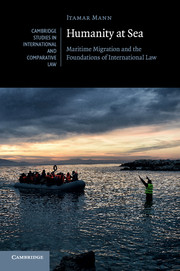Book contents
- Frontmatter
- Dedication
- Epigraph
- Contents
- List of Figures
- Acknowledgments
- Introduction: Humanity Washed Ashore
- 1 Flagless Vessel
- 2 What Is a Human Rights Claim?
- 3 What Is a Human Rights Commitment?
- 4 Between Moral Blackmail and Moral Risk
- 5 The Place Where We Stand
- 6 Imagination and the Human Rights Encounter
- Conclusion: The Dual Foundation of International Law
- Postscript
- Index
- CAMBRIDGE STUDIES IN INTERNATIONAL AND COMPARATIVE LAW
1 - Flagless Vessel
Published online by Cambridge University Press: 05 September 2016
- Frontmatter
- Dedication
- Epigraph
- Contents
- List of Figures
- Acknowledgments
- Introduction: Humanity Washed Ashore
- 1 Flagless Vessel
- 2 What Is a Human Rights Claim?
- 3 What Is a Human Rights Commitment?
- 4 Between Moral Blackmail and Moral Risk
- 5 The Place Where We Stand
- 6 Imagination and the Human Rights Encounter
- Conclusion: The Dual Foundation of International Law
- Postscript
- Index
- CAMBRIDGE STUDIES IN INTERNATIONAL AND COMPARATIVE LAW
Summary
“For the lawyer,” wrote Paul Weis in a 1954 article titled “The International Protection of Refugees,” “the status of a person who is deprived of national protection is ‘anomalous.’ A stateless person – and this applies equally to refugees – has been compared to a vessel on the open sea, not sailing under any flag.” By invoking this image, the legal advisor to the newly established United Nations High Commissioner for Refugees (UNHCR) posed a seemingly technical dilemma. “The lawyer” is not sure where jurisdiction over such persons lies, or who is to be held accountable for their plight. She may consult her books, but what she'll find is a missing page.
Weis's answer to this dilemma was his life's work. One of the major participants in formulating the 1951 Refugee Convention, he directed UNHCR's legal division up to his retirement in 1967. The treaty, alongside a host of other international legal instruments, sought to fill a gap in international law and grant a remedy to those who lost their ties to community or citizenship. Responding to events from the interwar period and during WWII, it culminated an attempt to solve the “refugee problem” through treaty law. Human rights would become a discipline that identified more than any other with a number of postwar treaties. A host of international governments, international organizations, and private actors would become entrusted with the task of administering treaty obligations in what came to be known as “transnational governance.”
Introducing the analogy of the flagless vessel – and the dilemma it represented – Weis probably did not have in mind a widely publicized chain of events that took place only a few years earlier. But when about 4,500 displaced Jews left Marseilles for Palestine on a boat that came to be known as the Exodus, they literally enacted his analogy. Though only one of many boats of Jews that aimed to reach Palestine clandestinely, the Exodus came to be the most famous of them all.
By literally enacting Weis's hypothetical, these migrants put it to a test. But the answer to his dilemma that their actions represented was a far cry from his efforts to advance treaty law as the foundation for human rights protection.
- Type
- Chapter
- Information
- Humanity at SeaMaritime Migration and the Foundations of International Law, pp. 21 - 55Publisher: Cambridge University PressPrint publication year: 2016



